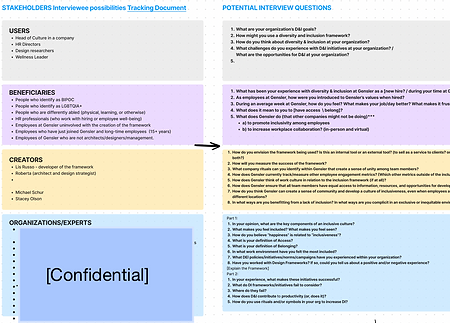GENSLER – Reimagining DEI impact on business
Type
Academic
Client
Gensler
Services
design research, opportunity framing, product design
Website
Project Summary
4 month external engagement with Gensler via an academic studio. The project was divided into two phases: group-based research and synthesis, and individual design of an intervention inspired by the research. The final deliverable was a 10-minute presentation with all the research findings, a summary of our design process, key insights, new market opportunities, and a service proposal with a digital prototype.
Brief
In Spring 2023, Gensler asked my Studio class to ’Stress-test’ their Culture of Inclusion framework. In the second half of the semester, we were given full creative license to use our research to design an intervention inspired by the framework.
In the group stage, I was responsible for project management and served as the team’s primary contact with the partner. In the individual stage, I was responsible for the end-to-end design process, including facilitating a brainstorming workshop with my broader studio group.



Approach
We used a mixed methodology combining Design Thinking tools with traditional design research tools such as primary interviews and desk research, and an 8-week speculative design sprint.
Using primary interviews, secondary research, and ecosystem mapping, we gathered stories of human experience. These stories illustrated the complexity of building a DEI framework that translates well across cultures, geographies, philosophies and economies. We developed recommendations for refining and implementing the framework, which we presented to the Gensler team.
Understand
Context-setting
Terminology Alignment
Ecosystem Mapping
Research
Primary Interviews
Desk Research
Synthesis
Define
Mindmapping
Problem Statement
Opportunity Framing
Ideate & Design
How Might We
Crazy 8s
Rose, Thorn, Bud
Wireframing
Low-fidelity prototype
Test & Refine
Hi-fidelity Prototype
User Testing
Summary of Process
Design and Prototyping
Based on our research synthesis, I reframed the brief to address how we might reimagine DEI by translating insights into structure and process in order to close the gap between awareness and accountability.
After initial design and low-fidelity prototyping exercises, I created a hi-fidelity prototype in Figma, which I tested with four potential users and refined based on feedback.

Result
A digital assessment tool that helps business leaders understand how traditionally “non-DEI” activities impact DEI, and how that investment in DEI translates to financial impact across the business.
Disclaimer: Tying DEI to a dollar value is controversial. But, I wanted to challenge the idea that companies would do something just because it was “the right thing to do.” Furthermore, I wanted to find a way to convince the skeptics of DEI that it’s not just a buzzword: it does have a quantifiable impact (outside of the anecdotal human experience.)